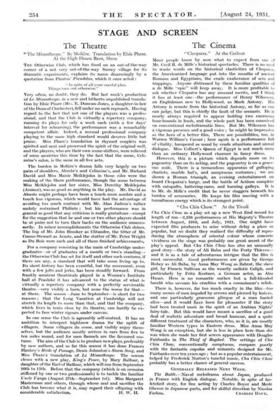"Chu Chin Chow." At the Tivoli Chu Chin Chow as
a play set up a new West End record for length of run-2,238 performances at His Majesty's Theatre between August, 1916, and July, 1921. One might have expected film producers to seize without delay a piece so popular, but no doubt they realized the difficulty of repro- ducing the atmosphere of oriental colour whose concrete vividness on the stage was probably one great secret of the play's appeal. But Chu Chin Chow has also an unusually good story—the story of Ali Baba and the Forty Thieves— and it is as a tale of adventurous intrigue that the film is most successful. Good performances are given by George Robey as Ali Baba, by Anna May Wong as Zahrat, the slave girl, by Francis Sullivan as the wearily sadistic Caliph, and particularly by Fritz Kortner, a German actor, as Abu Hasan. Here is no romantic outlaw but a full-blooded bandit who savours his cruelties with a connoisseur's relish.
There is, however, far too much cruelty in the film—too many scenes of men impaled by arrows and pierced by knives, and one particularly gruesome glimpse of a man buried alive—and it would have 'been far pleasanter if the story had been treated moie in the spirit of an Arabian Nights' fairy-tale. But this would have meant' a sacrifice of a good deal of realistic adventure and broad humour, and a quite different treatment of the characters, who, as it is, are mostly familiar Western types in Eastern dress. Miss Anna May Wong is an exception, but she is less in place here than she was when she made her first screen appearance with Douglas Fairbanks in The Thief of -Bagdad. The settings of Chu Chin Chow, conventionally sumptuous, compare poorly with the fantastic cupolas and minarets designed for Mr. Fairbanks over ten years ago ; but as a popular entertainment, helped by Frederick Norton's tuneful music, Chu Chin Chow probably has a better chance of general success.


































 Previous page
Previous page